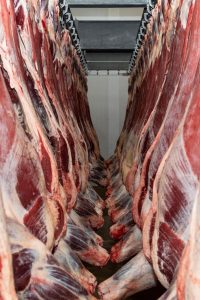– Farmers Guardian
 GOVERNMENT chiefs have said they had no plans to ban non-stun slaughter or label the meat from such animals, despite growing public concern over the issue.
GOVERNMENT chiefs have said they had no plans to ban non-stun slaughter or label the meat from such animals, despite growing public concern over the issue.
The RSPCA, which fed into a Parliamentary debate on animal welfare at the time of slaughter this week, said it was ‘deeply disappointed’ Ministers were not prepared to change the law.
The British Veterinary Association, which gathered more than 116,000 signatures supporting a ban, insisted Government ‘could no longer ignore the widespread consensus in the UK that slaughter without pre-stunning was completely unacceptable as it allowed animals to feel pain and compromised animal welfare’.
During the debate, Ministers agreed to promote post-cut stunning with the Muslim and Jewish communities, which the RSPCA welcomed.
David Bowles, head of RSPCA public affairs, said: “It is no surprise that around 8 in 10 people want an end to non-stun slaughter. There is growing public concern about the welfare of farm animals and people believe animals should be treated as humanely as possible throughout their lives, including at the time of slaughter.”
BVA president John Blackwell added that if the Government allowed non-stun slaughter to continue then it must introduce as ‘a matter of urgency’ clearer slaughter method labelling.
“While we know that more than 80 per cent of halal is pre-stunned, there is already more non-stun slaughter in percentage terms than the size of the Muslim and Jewish populations in the UK,” said Mr Blackwell.
“This means that some of it must be going outside of the communities for which it was intended. Clearer labelling will not only give consumers a choice but will help ensure the number of animals slaughtered is limited to satisfy the needs of the religious community concerned and thereby reduce the amount of non-stun slaughter.”
The YouGov survey highlighted some confusion over non-stun slaughter; with more than half (51 per cent) of Brits believing all halal meat is from animals which are not pre-stunned.
According to the Government’s Food Standards Agency, the large majority of halal does come from animals which have been stunned.



